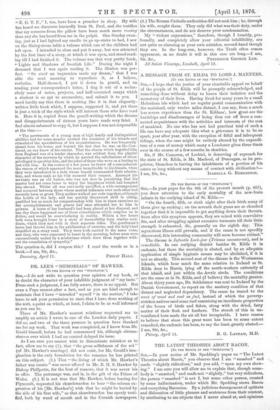DR. LEE'S "MEMORIALS" OF HAWKER. ;To THE EDITOR OF THE
SPECTATOR."] SIR,—I do not write to question your opinion of my book, or to doubt the character of your infallible judgment of " my taste." From such a judgment, I am fully aware, there is no appeal. But even a Pope cannot alter a fact, and as you are kind enough to maintain that I have " intruded " myself "in the matter," I take leave to ask your permission to state that I have done nothing of the sort, a point on which, at least, I claim to be as well informed as you can be.
Three of Mr. Hawker's nearest relations requested me to amplify an article I wrote in one of the London daily papers. I did so, and two of the three persons in question have thanked me for my work. That work was completed, as I know from Mr. Gould himself, before he had commenced his, although circum- stances over which I had no control delayed its issue.
As I am sure you cannot wish to disseminate mistakes as to fact, allow me to say (1), that "the gross selfishness of the act" (of Mr. Hawker's marriage) did not exist, for Mr. Gould's ima- gination is the only foundation for the romance he has printed on this subject. (2.) That " the living of which Mr. Hawker's father was curate" was never offered to Mr. R. H. S. Hawker by Bishop Phillpotts, for the best of reasons, that it was never his to offer. The patronage was, and is, in the gift of the Prince of Wales. (3.) It is not true that Mr. Hawker, before leaving for Plymouth, requested his churchwarden to hear "the solemn ex- pression of his [Mr. Hawker's] wish that he might be buried by the side of his first wife," as that churchwarden has openly testi- fied, both by word of mouth and in the Cornish newspapers. (4.) The Roman Catholic authorities did not seek him ; he, through his wife, sought them. They only did what was their duty, under the circumstances, and do not deserve your condemnation.
My "violent expressions," therefore, though I humbly, pro- foundly, and completely allow your editorial infallibility, are not quite so alarming as your own mistakes, second-hand though they are. In the long-run, however, the Truth often comes uppermost, as no doubt it will in this case ere long.—I am,,


































 Previous page
Previous page